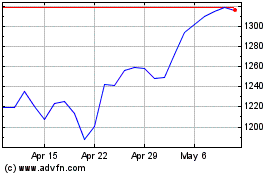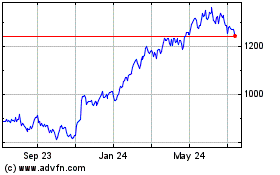Credit Markets: Pace of Ratings Reductions Speeds Up -- WSJ
April 03 2020 - 3:02AM
Dow Jones News
By Sebastian Pellejero
This article is being republished as part of our daily
reproduction of WSJ.com articles that also appeared in the U.S.
print edition of The Wall Street Journal (April 3, 2020).
U.S. corporate bonds are being downgraded at breakneck speeds,
highlighting the threat posed to companies' balance sheets by the
coronavirus crisis.
The pace of downgrades over the last two weeks was the fastest
on record in one major corporate-bond index going back to 2002,
according to BofA Global Research.
The index, known as the ICE BofAML U.S. Corporate Index, has
suffered $569 billion in downgrades since March 16, said Bank of
America.
Credit-ratings firms downgraded a net $560 billion of
investment-grade corporate bonds in the index last month, the bank
added. While total downgrades remained lower than at the same point
during the financial crisis, the pace accelerated in recent weeks
as ratings firms and investors reassessed the ability of borrowers
to repay their debts.
Fears that the crisis will spur bankruptcies and a prolonged
recession have helped drive the Bloomberg Barclays U.S. corporate
investment grade index down 3.9% in the first quarter of 2020, the
worst performance since the end 2016. Analysts said there is still
room for more companies to fall down the ratings ladder, with
businesses closed and consumers stuck at home, despite the Federal
Reserve's recent extraordinary efforts to support the corporate
debt market.
"The Fed programs cannot stem the negative actions that credit
rating agencies have already taken and will continue to take," said
UBS senior credit strategist Barry McAlinden. "Downgrades are a
normal part of an economic down cycle, and the anticipation for
negative rating actions is a reason why [investment-grade bond]
spreads are where they currently stand."
Investors are being compensated more to hold corporate bonds.
Adjusted for options, the spread, or extra yield investors demanded
to hold investment-grade U.S. corporate bonds in the Bloomberg
Barclays index over Treasury bonds increased by 1.79 percentage
points during the first quarter -- a record, according to Dow Jones
Market Data.
Investors watch downgrades because it is one sign of
deteriorating conditions in the corporate sector. Many funds also
can't hold debt below investment-grade, so downgrades could put
added pressure on the debt market in an already difficult trading
environment.
"A wave of downgrades would unquestionably cause disruption
given the swell of new names into the high-yield market," said Mike
Terwilliger, portfolio manager at Resource America. "The market
would absorb the paper, but it would definitely bring a temporary
downdraft."
Downgrades haven't stopped a deluge of new bonds being sold by
investment-grade companies. A record amount was issued last week,
and in recent days, some speculative-grade companies have joined
in. After Yum Brands Inc. completed the first high-yield bond sale
in nearly a month on Monday, more have followed. Sales by aerospace
manufacturer TransDigm Group Inc., fast-food operator Restaurant
Brands International Inc. and Tenet Healthcare Corp. were expected
to close on Thursday.
U.S. Treasury yields were down on Thursday. The benchmark
10-year yield fell to 0.624%, according to Tradeweb, from 0.630% at
Wednesday's close. The intraday yield of the 30-year bond fell to
1.268%, from 1.285%.
As downgrades from ratings firms like S&P and Moody's
accelerate, more companies at the lower rungs of the
investment-grade bond market are at risk of having their ratings
pushed into junk territory, becoming what is known on Wall Street
as fallen angels. More than $97 billion in debt tied to 13
companies including Ford Motor Co., Occidental Petroleum Corp., and
Western Midstream Partners LP lost investment-grade status in
March.
Wall Street analysts say more fallen angels are likely, with
many triple-B bond investors demanding larger spreads compared with
their speculative-grade counterparts. Around $343 billion of
triple-B rated bonds issued in developed markets trade at a higher
premium over U.S. Treasurys than double-B rated bonds, says Bank of
America.
Cruise operator Carnival Corp., which is under review for
downgrades, sold $4 billion of new triple-B bonds Wednesday at an
initial yield of 11.9%. T-Mobile Inc. was set to sell triple-B
bonds to pay down a bridge loan used to fund its purchase of Sprint
Corp.
--Sam Goldfarb contributed to this article.
Write to Sebastian Pellejero at sebastian.pellejero@wsj.com
(END) Dow Jones Newswires
April 03, 2020 02:47 ET (06:47 GMT)
Copyright (c) 2020 Dow Jones & Company, Inc.
Transdigm (NYSE:TDG)
Historical Stock Chart
From Mar 2024 to Apr 2024

Transdigm (NYSE:TDG)
Historical Stock Chart
From Apr 2023 to Apr 2024
